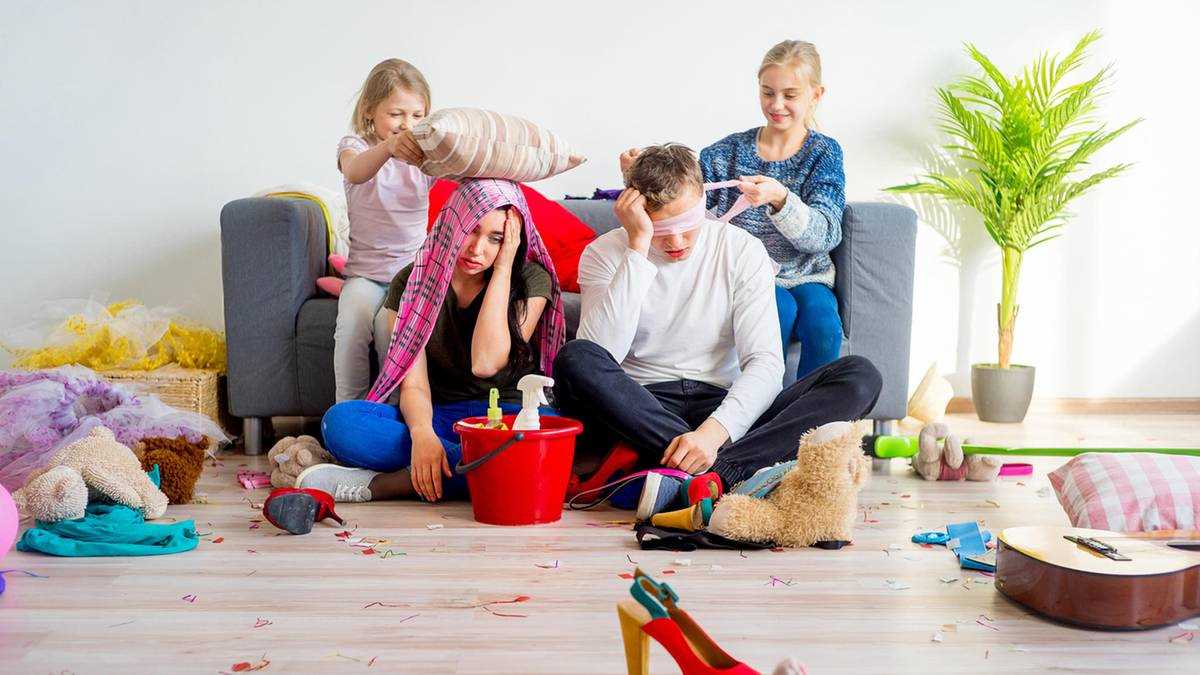Had a clairvoyant told me 10 years ago that my children would be very orderly, I would have reported this clairvoyant for fraud. Still, it happened somehow. My kids are cleanup heroes. How did I do it? Here are my 10 wisdoms. Call me the Marie Kondo for children. Buy all the books I will have written about it in 10 years. And listen to my wisdom. Even if it happened by mistake …
1.Clean up yourself
The good thing about it if you are not a particularly orderly person yourself: You are never tempted to take it from the children. So the little ones realize very early on that they are responsible for their own crap. It took us a few years to get that. But when it does happen, it's a big WOW effect. When I enter my child's nursery, I am a visitor and I respect their rules. "Mom, there is no cutting on the floor!" My 6-year-old recently explained to me. "Then the snippets slip under the carpet and it's difficult to get them out of there." Listen and be amazed. She would never have noticed that if I had collected the snippets for her.
2. Cleaning up is great fun
"There is fun in every job," Mary Poppins taught us. Even the great tidying up master Marie Kondo sees this as the secret. In her Netflix series, a father asked her how she cleaned up her two young children. "Not at all. They see that I enjoy it, so they do it all by themselves," she told him. I believe you. I don't really like cleaning up, but I do everything I can to make it as nice as possible. I turn on loud music and dance like crazy in the house while I put everything in its place. If children don't combine cleaning up with pressure and threats, they just don't seem to be blocking it.
3. Only those who know disorder learn to love order
Maybe the "We clean up every night" method also works. But I'm afraid that this will not work for teenagers at the latest without lying in the permanent clink. Disorder is expressly allowed in our home. Because how should my children understand that order makes everything more beautiful if they don't know any disorder? If a four-year-old absolutely wants to clean up because he can no longer find his favorite toys in the chaos, it makes a lot more sense than a learned belief without experience.
4. Boxes, boxes, boxes
A basic lesson from Marie Kondo: Everything needs a fixed place and must be visible. I give my children every shoebox and everything else that can be used as an organization system. Sorting is actually the same as playing.
5. Things have a soul. Children know that
Can't your child separate themselves from cuddly toys, pictures, toys and rubbish? Maybe because children know that things have a soul. Or why else have we used to drape forty-three stuffed animals and dolls around us so that none is sad? Saying goodbye and thanking the Konmari method helps my children. With us, nothing flies in the garbage without being ugly dismissed for the joy it gave us. This makes it easier to say goodbye.
6.Egon, the hungry trash can
We have a trash can that we made a funny face for. This wastebasket is always very hungry and only likes painted paper. When Egon is hungry, throwing away is much easier. Particularly beautiful paintings are of course kept. Because of course we have a place for that.
7. Children are more social than many adults
Sorting is easy for my children, because they know that others are not as well as we are. Toys are particularly popular in social department stores. Since I explained to my children that parents who don't have much money can buy birthday presents for their little ones in these department stores, for example, at a reasonable price, they have been very keen to donate discarded things. Again and again we are very happy with the feeling of giving away all the toys from which they have grown. This is less stressful and more beautiful than a flea market and teaches not only the art of mucking out, but also the art of letting go and giving.
8. Less is more
Again and again we put whole toy categories (for example the Duplo, the Playmobil house or the Lego train in a closet in our study. If we exchange them after a few weeks, things are rediscovered with completely new eyes. Nice side effect: cleaning up is like this much easier than when the whole room is full.
9. Your room, your responsibility
Those who bluff lose. If you only pretend to leave the responsibility for the nursery to the children, there is no chance of rebellion. It was only when I REALLY let go that the children took command. This includes offering help and advice, but also accepting a "No thanks". Or as the little prince puts it: "I must have two or three caterpillars endure if I want to get to know the butterflies. "
10. Enjoy the beauty of imperfection together
With all the love of order: I do not want to raise children who always see a TO DO if everything is not perfect. I don't want to tell them to clean up in the middle of the game before they get out a new toy. Creativity means bringing things together that don't belong together. And if you have to build a blanket-pillow cave for the slow-moving dinosaur who likes to take the Lego train to his girlfriend, the doll, for whom a door sign needs to be quickly made on the bed, then that's just the way it is. For some reason my kids want to clean up later. The emphasis is on later. And that's just as well.
Who writes here:
Miriam Kühnel
